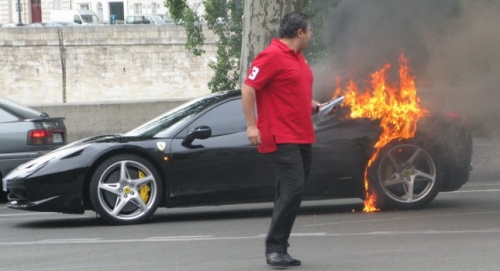The $30 Rainy Day Fund Secret To Making Your Life Secure
/
Fire in your Ferrari 458? Expect the unexpected - carscoop
Whether you're a lottery winner or not, everyone needs an emergency fund.
A major car repair, job loss, an accident around your home, costly renovations you didn't expect... all this can make a serious dent in your cash flow.
Most financial planners say you should be putting money away regularly to cover these "rainy day" problems.
But I don't agree.
To me, saving for these unlikely events just doesn't make sense. We spend a great deal of our working life putting money into the bank just to get a small amount of interest back. Then it sits there doing nothing maybe for years. It's just a waste.
This lump of money doesn't do anything except represent a period of earning in your life that is gone forever.
Only when you use the sum does it become valuable. Money is designed to be in motion. Otherwise it's useless as a chocolate fireguard.

But I do agree that you need some rainy day reserves. So what's the alternative?
SECRET: You must build several lines of credit - and never use them.
Let's say you estimate you'd need $10,000 to keep you going for six months without a job or for an emergency. Instead of saving up that amount, find a way to get the same amount in credit.
You can do it 2 ways:
1- Get a new credit card, or two, but never use them. Put them in a safety deposit box if you ever think you'll be tempted to use them. Pay the annual fees and consider the $30 a year or so as a bonus for having that amount of money available to you on call.
2- Extend a line of credit on your mortgage. If you haven't revalued your house in the last few years, you might be surprised at how much it's gone up. Take out a $10,000 line of credit.
Now you've got the security of an emergency buffer - without sacrificing a couple of years of your life to save for it!
(I'm no Suze Orman - my financial views are sometimes unconventional. So always get advice from a qualified financial expert first).





































